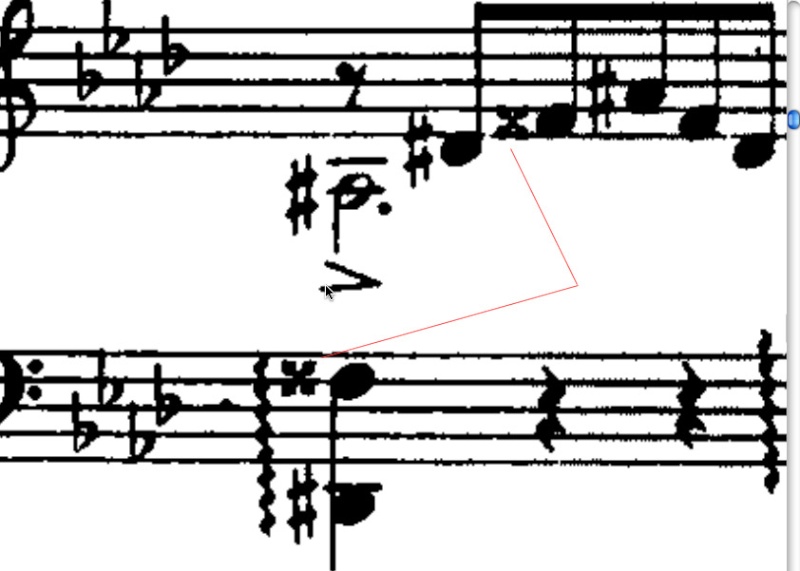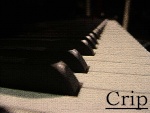What does this mean?
+2
CripKilla
Phi
6 posters
Page 1 of 1
 What does this mean?
What does this mean?
Hi.
I came across this sign in a piece...

I'd be grateful for any input.
Thanks.
I came across this sign in a piece...

I'd be grateful for any input.
Thanks.
Phi- Well-known Pianist

-
 Number of posts : 122
Number of posts : 122
Age : 34
Location : UK
Job/hobbies : Student/Gaming, Piano, Programming
Length of time playing piano : Since Feb. 08
Guru Points : 0
Registration date : 2008-05-06
 Re: What does this mean?
Re: What does this mean?
it's a double sharp.  2 semi-tones higher the note wrote.
2 semi-tones higher the note wrote.
But I got a question too: if what does a sharped double sharp do(double sharp+key sign)? is that a triple sharp?
But I got a question too: if what does a sharped double sharp do(double sharp+key sign)? is that a triple sharp?

CripKilla- Well-known Pianist

-
 Number of posts : 423
Number of posts : 423
Location : Hyrule Field
Job/hobbies : Bank Robber
Length of time playing piano : Since Huamn Existence
Guru Points : 12
Registration date : 2008-04-21
 Re: What does this mean?
Re: What does this mean?
Thanks a lot, Cripkilla..CripKilla wrote:it's a double sharp.2 semi-tones higher the note wrote.
But I got a question too: if what does a sharped double sharp do(double sharp+key sign)? is that a triple sharp?
Your question isn't really clear... anyway, I'll give it a shot
If [for instance] the piece is written in Dmajor and there's a double-sharp on F, you'd play G#... this takes into consideration, the key signature.
Once again, thanks.
Phi- Well-known Pianist

-
 Number of posts : 122
Number of posts : 122
Age : 34
Location : UK
Job/hobbies : Student/Gaming, Piano, Programming
Length of time playing piano : Since Feb. 08
Guru Points : 0
Registration date : 2008-05-06
 Re: What does this mean?
Re: What does this mean?
In my Last piece It DOES NOT take the keysignature into consideration. Cause the note its written on is originally a G# but still the G dubblesharp in this piece only makes the G an -> A and not a A#. If it had taken the keysignature into consideration it would have been a A#!! But I dont got the answer, I only know that in this piece the keysignature isnt a factor while using a dubblesharp 
I have also come along many sheets that use their own small rules that is Not acourding to the normal rules. So my advice is to try to find recordings and listen or of course ask here hehe
hehe
But I tend to find out if there is deascent recordings on youtube!
I have also come along many sheets that use their own small rules that is Not acourding to the normal rules. So my advice is to try to find recordings and listen or of course ask here
But I tend to find out if there is deascent recordings on youtube!
 Re: What does this mean?
Re: What does this mean?
Allright! 

CripKilla- Well-known Pianist

-
 Number of posts : 423
Number of posts : 423
Location : Hyrule Field
Job/hobbies : Bank Robber
Length of time playing piano : Since Huamn Existence
Guru Points : 12
Registration date : 2008-04-21
 Re: What does this mean?
Re: What does this mean?
But I just notices: In this sheet ex the dubble sharp is on a F, so then this wont be an issue. That F is a G 
 Re: What does this mean?
Re: What does this mean?
Really!! I'd always thought that the key-signature is prevalent on the ENTIRE piece, unless a different signature is introduced in-between. -means I was wrong then.Thomandy wrote:In my Last piece It DOES NOT take the keysignature into consideration. Cause the note its written on is originally a G# but still the G dubblesharp in this piece only makes the G an -> A and not a A#. If it had taken the keysignature into consideration it would have been a A#!! But I dont got the answer, I only know that in this piece the keysignature isnt a factor while using a dubblesharp
Using your example, thomandy; if a double sharp falls on G, and the piece is written in G#, you'd play an A because nothing affects G in the key-signature of G#[Ab]
Thanks for the insight...

Phi- Well-known Pianist

-
 Number of posts : 122
Number of posts : 122
Age : 34
Location : UK
Job/hobbies : Student/Gaming, Piano, Programming
Length of time playing piano : Since Feb. 08
Guru Points : 0
Registration date : 2008-05-06
 Re: What does this mean?
Re: What does this mean?
Phi wrote:Really!! I'd always thought that the key-signature is prevalent on the ENTIRE piece, unless a different signature is introduced in-between. -means I was wrong then.Thomandy wrote:In my Last piece It DOES NOT take the keysignature into consideration. Cause the note its written on is originally a G# but still the G dubblesharp in this piece only makes the G an -> A and not a A#. If it had taken the keysignature into consideration it would have been a A#!! But I dont got the answer, I only know that in this piece the keysignature isnt a factor while using a dubblesharp
Using your example, thomandy; if a double sharp falls on G, and the piece is written in G#, you'd play an A because nothing affects G in the key-signature of G#[Ab]
Thanks for the insight...
Well, yeah.. But I also said that I dont got the correct ansrwer, so dont kill me if that is wrong. But on that piece it is like I wrote in that ex. But I also know that some arangements also avoid the basic rules and makes some of their own. So look at it with critical eyes, and test it!
 Re: What does this mean?
Re: What does this mean?
yup, just to give more resovle to the question, the double sharp doesn't take into account the key signature, it overrides it.  think of it like adding a sharp onto the sharp already there. ^_^
think of it like adding a sharp onto the sharp already there. ^_^
 Re: What does this mean?
Re: What does this mean?
Thanks, Andrew.Admin Andrew wrote:yup, just to give more resovle to the question, the double sharp doesn't take into account the key signature, it overrides it.think of it like adding a sharp onto the sharp already there. ^_^
Why can't they [the composers] just position the note on the played line? Is there any reason they use double sharps and flats? as in: is there any musical significance?
Phi- Well-known Pianist

-
 Number of posts : 122
Number of posts : 122
Age : 34
Location : UK
Job/hobbies : Student/Gaming, Piano, Programming
Length of time playing piano : Since Feb. 08
Guru Points : 0
Registration date : 2008-05-06
 Re: What does this mean?
Re: What does this mean?
For the visual.. like easier to read.. 

CripKilla- Well-known Pianist

-
 Number of posts : 423
Number of posts : 423
Location : Hyrule Field
Job/hobbies : Bank Robber
Length of time playing piano : Since Huamn Existence
Guru Points : 12
Registration date : 2008-04-21
 Re: What does this mean?
Re: What does this mean?
easier to read... eh?CripKilla wrote:For the visual.. like easier to read..
Don't you think it'd have been a lot easier to read if, in the piece I posted, the first note [with a double sharp] was placed on the G instead?
I think they're all just show-offs!!
Phi- Well-known Pianist

-
 Number of posts : 122
Number of posts : 122
Age : 34
Location : UK
Job/hobbies : Student/Gaming, Piano, Programming
Length of time playing piano : Since Feb. 08
Guru Points : 0
Registration date : 2008-05-06
 Re: What does this mean?
Re: What does this mean?
I know, some sheet notation is just "fail". Some things are just made harder then it is. And some things need to change...
Like inches and feet, and mph, and left side driving
We live in the 20th century, things should be more globaliZed, and the most used systems should be mandatory.
That was totally off topic, back to topic. Some stuff just seems to weird to be true, like a double sharp.
Who invented it, and why was it a "good" idea? It seems like they made it complicated,
to make it look harder than it really was, but why they havent changed it in newer times, dont ask.
Like inches and feet, and mph, and left side driving

We live in the 20th century, things should be more globaliZed, and the most used systems should be mandatory.
That was totally off topic, back to topic. Some stuff just seems to weird to be true, like a double sharp.
Who invented it, and why was it a "good" idea? It seems like they made it complicated,
to make it look harder than it really was, but why they havent changed it in newer times, dont ask.

VictorCS- Moderator

-
 Number of posts : 944
Number of posts : 944
Location : Norway
Length of time playing piano : Started playing seriously in 2007, and been doing so since.
Guru Points : 18
Registration date : 2008-03-09
 Re: What does this mean?
Re: What does this mean?
It is to fit the notes to the system. I find it normal now to look at fex B# and E# because that now, feels easer than nutral F and B's... Before i couldnt undersand it. Like dubble sharps and dubble flats, it is a way to fit the notes to a very complex system. It is rather easy when you just know the rules!! 
 Re: What does this mean?
Re: What does this mean?
Well,
I have a question ..
I always see in the classical pieces for example :
Mozart Sonata in C major ( So this indicates that the Key Signature is a C major ? )
I know that it's a foolish question ..
But I need to know the answer ...
THANKS,
I have a question ..
I always see in the classical pieces for example :
Mozart Sonata in C major ( So this indicates that the Key Signature is a C major ? )
I know that it's a foolish question ..
But I need to know the answer ...
THANKS,

Amro- Well-known Pianist

-
 Number of posts : 340
Number of posts : 340
Age : 33
Job/hobbies : Graphics, Internet & Piano
Length of time playing piano : 2 Years of Trying but seriously from 4 Mnths.
Guru Points : 3
Registration date : 2008-07-17
 Re: What does this mean?
Re: What does this mean?
Amro wrote:Well,
I have a question ..
I always see in the classical pieces for example :
Mozart Sonata in C major ( So this indicates that the Key Signature is a C major ? )
I know that it's a foolish question ..
But I need to know the answer ...
THANKS,
Yep, it would indicate that the piece is primarily written in C major, but it MAY modulate to other keys, but I can ALMOST guarantee that it WILL end on the tonic of C major.
 Re: What does this mean?
Re: What does this mean?
Admin Andrew wrote:Yep, it would indicate that the piece is primarily written in C major, but it MAY modulate to other keys, but I can ALMOST guarantee that it WILL end on the tonic of C major.
Yeah ... I was thinking of this alot ...
Thanks for the info.

Amro- Well-known Pianist

-
 Number of posts : 340
Number of posts : 340
Age : 33
Job/hobbies : Graphics, Internet & Piano
Length of time playing piano : 2 Years of Trying but seriously from 4 Mnths.
Guru Points : 3
Registration date : 2008-07-17
 Re: What does this mean?
Re: What does this mean?
Amro wrote:Admin Andrew wrote:Yep, it would indicate that the piece is primarily written in C major, but it MAY modulate to other keys, but I can ALMOST guarantee that it WILL end on the tonic of C major.
Yeah ... I was thinking of this alot ...
Thanks for the info.
No problem, The reason they even use different keys is that each key has a different "mood" or "colour" so they write a song for the key based on the colour it gives us.
Bach wrote a prelude & Fugue for EVERY single key in a really cool book called WTC (The Well Tempered Clavier) There are TWO books. Volume I and Volume II, They're like the bible for piano study, I'd suggest once you get to a higher level to start learning some of them. ^_^ Once you're done with those, work on Chopin's Etudes and his book of Preludes (which he dedicated to Bach).
 Re: What does this mean?
Re: What does this mean?
Admin Andrew wrote:
No problem, The reason they even use different keys is that each key has a different "mood" or "colour" so they write a song for the key based on the colour it gives us.
Bach wrote a prelude & Fugue for EVERY single key in a really cool book called WTC (The Well Tempered Clavier) There are TWO books. Volume I and Volume II, They're like the bible for piano study, I'd suggest once you get to a higher level to start learning some of them. ^_^ Once you're done with those, work on Chopin's Etudes and his book of Preludes (which he dedicated to Bach).
Thank you Thank you Thank you ...
By the way how could I know my Level like 3,4,...,9
I mean the Grade I'm In ??
Thanks alot .. i'll search for these books
I found alot of HUGE books in the library for Bach, Beethoven, Chopin, Strauss, Debussy, etc ..
Complete works, Histories, Lives,etc ..
But they were a bit hard for me ...
as I am such a Beginner
YOU ARE GREAT






Amro- Well-known Pianist

-
 Number of posts : 340
Number of posts : 340
Age : 33
Job/hobbies : Graphics, Internet & Piano
Length of time playing piano : 2 Years of Trying but seriously from 4 Mnths.
Guru Points : 3
Registration date : 2008-07-17
 Re: What does this mean?
Re: What does this mean?
Amro wrote:
By the way how could I know my Level like 3,4,...,9
I mean the Grade I'm In ??
Well, the only secure way to know is to take an exam. If you pass a grade 5 exam, you are at least at a grade 5..
But, it is of course a way to tell where you are without exams +
If you can learn and play grade 5pieces fast, at a high level, then you are a grade 5. What is fast I dont know. But I guess about 20hours?? Or something like that. If you can do Every single 5grade pieces within this short period of time, I recon you can consider yourselfe a grade 5 without taking an exam
 Re: What does this mean?
Re: What does this mean?
Thomandy wrote:Well, the only secure way to know is to take an exam. If you pass a grade 5 exam, you are at least at a grade 5..
But, it is of course a way to tell where you are without exams +
If you can learn and play grade 5pieces fast, at a high level, then you are a grade 5. What is fast I dont know. But I guess about 20hours?? Or something like that. If you can do Every single 5grade pieces within this short period of time, I recon you can consider yourselfe a grade 5 without taking an exam
OK .. Got it ...
But how should I know that this piece in Level 5 for example ..
Should I Google it ??

Amro- Well-known Pianist

-
 Number of posts : 340
Number of posts : 340
Age : 33
Job/hobbies : Graphics, Internet & Piano
Length of time playing piano : 2 Years of Trying but seriously from 4 Mnths.
Guru Points : 3
Registration date : 2008-07-17
 Re: What does this mean?
Re: What does this mean?
Amro wrote:Thomandy wrote:Well, the only secure way to know is to take an exam. If you pass a grade 5 exam, you are at least at a grade 5..
But, it is of course a way to tell where you are without exams +
If you can learn and play grade 5pieces fast, at a high level, then you are a grade 5. What is fast I dont know. But I guess about 20hours?? Or something like that. If you can do Every single 5grade pieces within this short period of time, I recon you can consider yourselfe a grade 5 without taking an exam
OK .. Got it ...
But how should I know that this piece in Level 5 for example ..
Should I Google it ??
It is sometimes hard to find out. But try to google it
 Re: What does this mean?
Re: What does this mean?
"Grade 5" depends on what examination body you decide to be assessed by. Here in the UK, there are two main boards people take exams with :Trinity College London, and ABRSM. Depending on the exam boards you consider, "Grade 5" standard could be different!Amro wrote:Thomandy wrote:Well, the only secure way to know is to take an exam. If you pass a grade 5 exam, you are at least at a grade 5..
But, it is of course a way to tell where you are without exams +
If you can learn and play grade 5pieces fast, at a high level, then you are a grade 5. What is fast I dont know. But I guess about 20hours?? Or something like that. If you can do Every single 5grade pieces within this short period of time, I recon you can consider yourselfe a grade 5 without taking an exam
OK .. Got it ...
But how should I know that this piece in Level 5 for example ..
Should I Google it ??
ABRSM is more of a global standard... You could go to their website and have a look at the piano syllabus for different grades.
http://www.abrsm.org/?page=exams/gradedMusicExams/latestSyllabuses.html
Phi- Well-known Pianist

-
 Number of posts : 122
Number of posts : 122
Age : 34
Location : UK
Job/hobbies : Student/Gaming, Piano, Programming
Length of time playing piano : Since Feb. 08
Guru Points : 0
Registration date : 2008-05-06
 Re: What does this mean?
Re: What does this mean?
Thomandy wrote:
It is sometimes hard to find out. But try to google itI have found some pieces's grades that way!
But be sure to dobblecheck. Sometimes there are easyer versions also that are at lower grades, and it might be that it is the easyest (or the hardest) grade that you find and that you really are looking for the other grade, if you understand my messy explanation
hehe
OK !!
I Got a Point ..

Thanks alot

Amro- Well-known Pianist

-
 Number of posts : 340
Number of posts : 340
Age : 33
Job/hobbies : Graphics, Internet & Piano
Length of time playing piano : 2 Years of Trying but seriously from 4 Mnths.
Guru Points : 3
Registration date : 2008-07-17
 Re: What does this mean?
Re: What does this mean?
Phi wrote:
"Grade 5" depends on what examination body you decide to be assessed by. Here in the UK, there are two main boards people take exams with :Trinity College London, and ABRSM. Depending on the exam boards you consider, "Grade 5" standard could be different!
ABRSM is more of a global standard... You could go to their website and have a look at the piano syllabus for different grades.
http://www.abrsm.org/?page=exams/gradedMusicExams/latestSyllabuses.html
Wow !!
It's Really a Great Link ...
Useful for Me ...

Thanks alot

Amro- Well-known Pianist

-
 Number of posts : 340
Number of posts : 340
Age : 33
Job/hobbies : Graphics, Internet & Piano
Length of time playing piano : 2 Years of Trying but seriously from 4 Mnths.
Guru Points : 3
Registration date : 2008-07-17
Page 1 of 1
Permissions in this forum:
You cannot reply to topics in this forum
 How to play piano.ca
How to play piano.ca



» What's Happened...?
» Thomas's Performances - NEW Liszt Moments Musicaux D.01 - Page 39
» latin rhythms on piano
» What is the deal with time signatures with a bottom number of 16?
» Piano Dog's Lick of The Week
» How to span notes
» Great sight reading exercises
» Hey guys! How's it going?